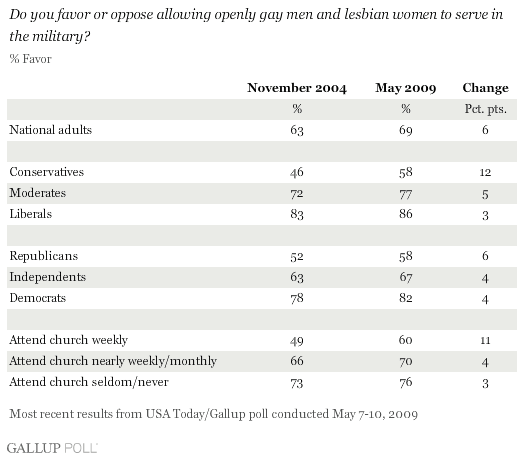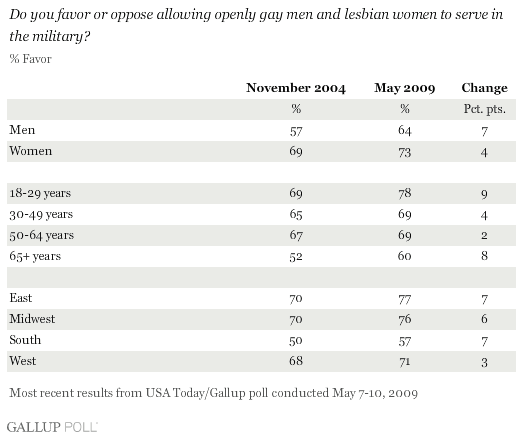WASHINGTON, D.C. -- Americans are six percentage points more likely than they were four years ago to favor allowing openly gay men and lesbian women to serve in the military, 69% to 63%. While liberals and Democrats remain the most supportive, the biggest increase in support has been among conservatives and weekly churchgoers -- up 12 and 11 percentage points, respectively.

The finding that majorities of weekly churchgoers (60%), conservatives (58%), and Republicans (58%) now favor what essentially equates to repealing the "Don't Ask, Don't Tell" policy implemented under President Clinton in 1993 is noteworthy for several reasons. First, the data show that these traditionally conservative groups are shifting on this issue, supporting it to a far greater extent than they support legalized gay marriage. Second, it suggests the political playing field may be softer on this issue, and President Barack Obama will be well-positioned to forge ahead with his campaign promise to end the military ban on openly gay service members with some support from more conservative segments of the population. To date, it is estimated that more than 12,500 servicemen and servicewomen have been discharged under the policy, including more than 200 since Obama took office.
Overall, the groups most in favor of allowing openly gay service members to serve in the military continue to be liberals (86%) and Democrats (82%), followed by Americans 18 to 29 (78%) -- whose support registered a nine-point jump in support from 2004.
While men (64%) and Americans 65 and older (60%) have levels of support more in line with right-leaning groups than with left-leaning groups on this issue, they join virtually all other demographic segments of the population in registering an increase in support since 2004.

The only exception to the trend in favor of openly gay service members is seen among those with a high school education or less, who showed 57% support in both surveys.
Bottom Line
Gallup Poll data from 2009 reveal that majority support among Americans for repealing "Don't Ask, Don't Tell" has only strengthened in recent years. Repealing the policy is a promise Obama made on the campaign trail and is one that gay rights groups have recently been more vocal in urging him to fulfill. While the administration to date has not taken action on the issue, the Gallup Poll data indicate that the public-opinion environment favors such a move.
In particular, the more conservative segments of the population who could be expected to be most resistant to such a policy change have shifted in favor of repealing the existing ban, to the extent that majority support now spans all segments of the population. At the same time, it is important to note that the Gallup Poll data do not break out the attitudes of current members of the military or provide a read on the views of current military leadership, whose reactions may be a major factor in the Obama administration's decisions on a change in policy.
As the Obama administration weighs the political and military consequences of a policy change on this issue, it can do so knowing Americans are for the most part strongly in favor of change toward allowing gay men and lesbian women to serve openly alongside their fellow service members.
Survey Methods
Results are based on telephone interviews with 1,015 national adults, aged 18 and older, conducted May 7-10, 2009, and with 1,015 national adults, aged 18 and older, conducted Nov. 19-21, 2004. For results based on these total samples of national adults, one can say with 95% confidence that the maximum margin of sampling error is ±3 percentage points.
Interviews are conducted with respondents on land-line telephones (for respondents with a land-line telephone) and cellular phones (for respondents who are cell-phone only).
In addition to sampling error, question wording and practical difficulties in conducting surveys can introduce error or bias into the findings of public opinion polls.
